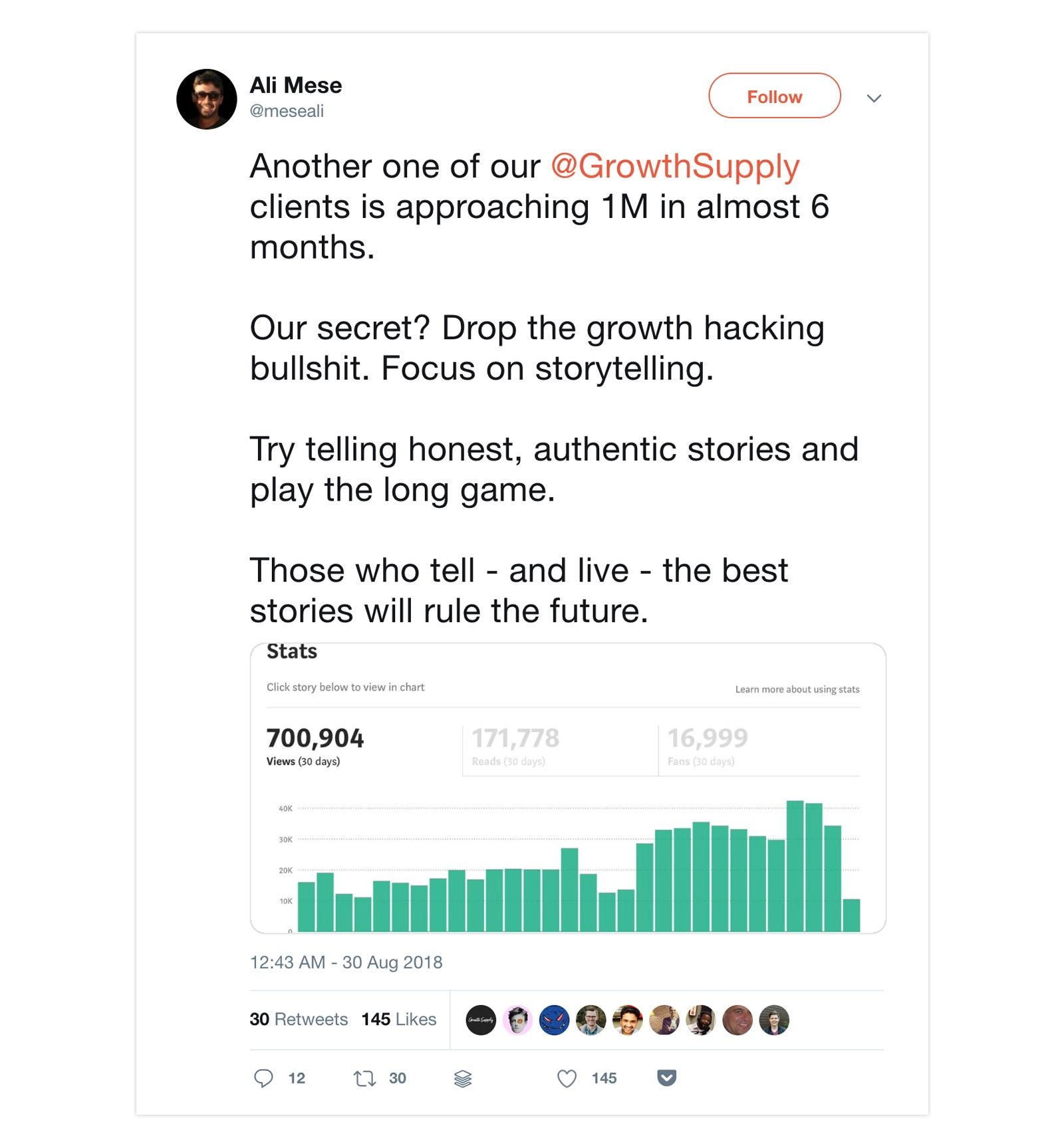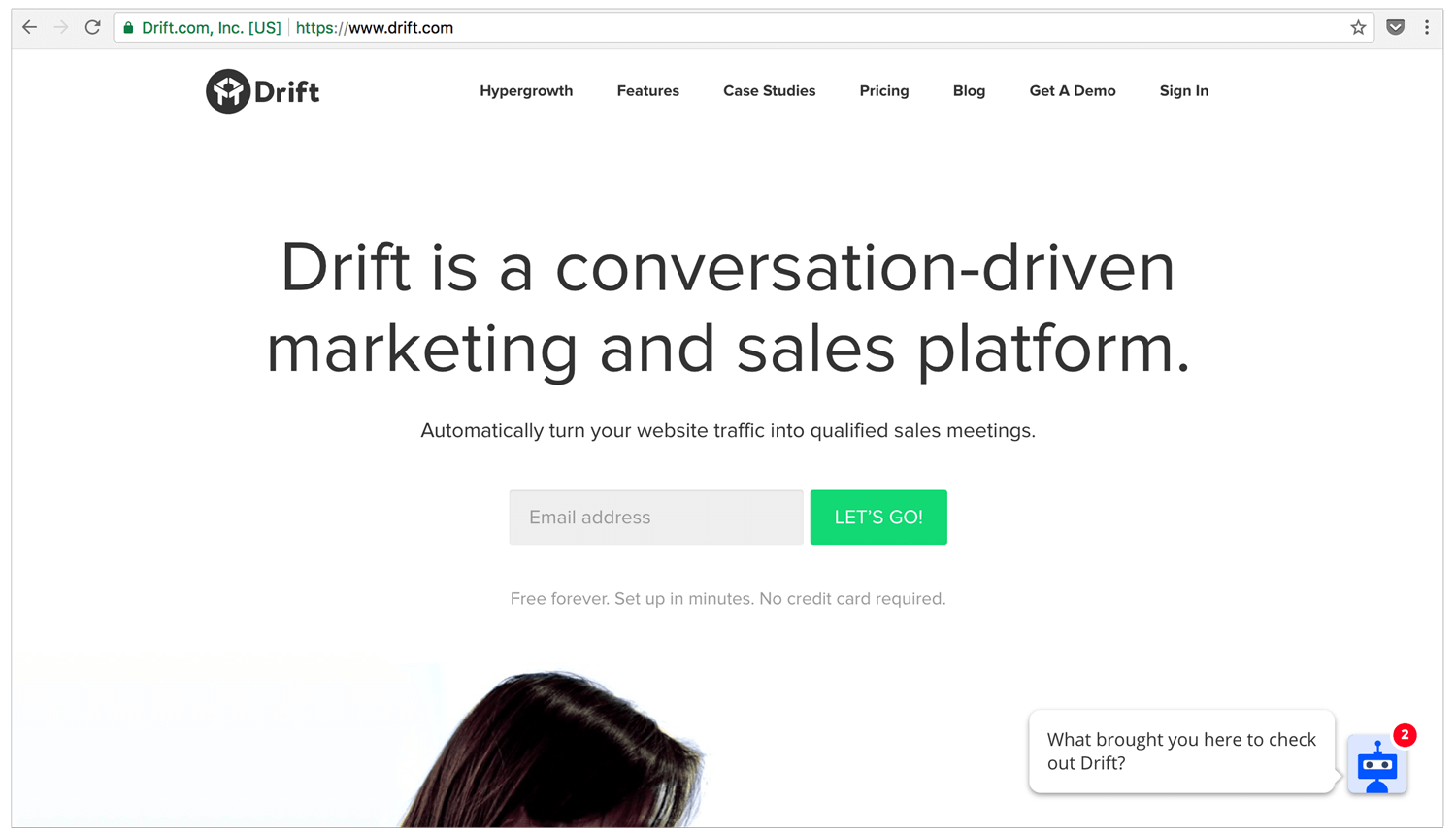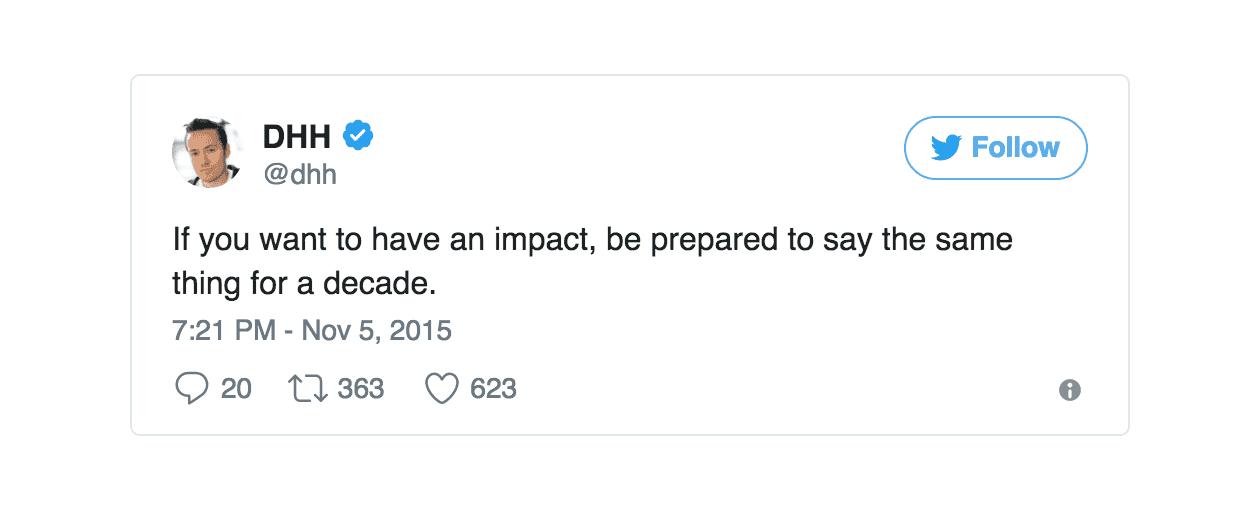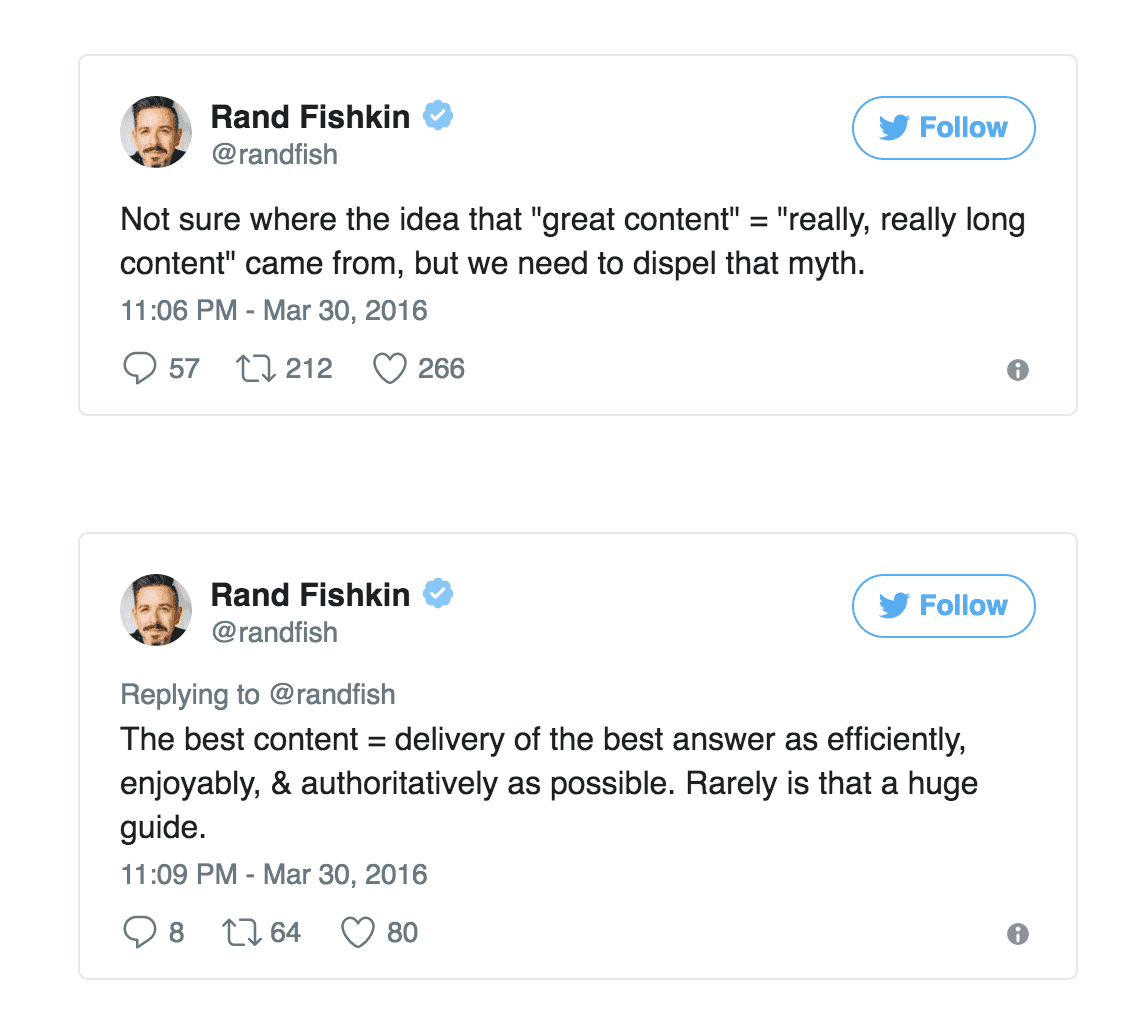How we got 11.3 million pageviews without the growth hacking bullshit
“Once you publish a blog post, you have to email as many influencers as possible,” he tells the guy next to him, “and ask them to share it on their social media.”
I know I should mind my own business and stop listening to their conversation. But overhearing strangers in coworking spaces is always more interesting than staring at my screen all day long.
“Start your email with a sentence that flatters them. Maybe just pretend you care about something they published.” He adds, “You’ll also need software to track if they open your emails so you can send them follow-up emails later.”
So you can keep spamming them, I want to walk up to them and correct him. But I don’t judge him. We marketers love to destroy beautiful things.
Want to ruin something? Give it to us. Take influencer… social media… email… LinkedIn… we’ll add the word “marketing” next to each one and before long the world will be sick of our spammy tactics.
The word “content” isn’t any exception. In a recent essay, Intercom’s editor John Collins explains why they dropped the term “content marketing”:
“Combine ‘content’ with ‘marketing’ and you further undermine what you’re creating. The phrase suggests the entire point of the exercise is marketing. But if you focus on publishing great content, you’ll actually need to do minimal marketing to attract people to your product.”
Collins goes on to highlight that the term “content” itself is also problematic.
And he is right: “content” does commodify the core of what we do. But we all continue to use the word for want of a better catch-all phrase for our articles, books, and podcasts.
But do we have a better alternative?
‘Storytelling’ as a growth engine
11.3 million.
That’s the number of pageviews the “content” we created for our clients got over the last nine months.
People want me to talk about growth hacks or loopholes we found with Facebook ads. But our formula comes down to one thing we believe does a healthier job of capturing what we do: storytelling.

We discovered that if we focus on storytelling and worry little about the marketing part, the compound return that kicks in at around the fourth to the sixth month is simply mind-blowing.
We spend long hours, often a few days, on a single story.
Growth begins with words. Stories, they move people. And moving people is magical for building a business on your own terms, without worrying about competition.
The reason is simple: People don’t desire products. They desire feelings that products give them.
And storytelling is an incredible tool that acknowledges such distinction, a tool so few people are capable of using or understand the true potential of.

Getting people to read your story, a long-form essay, or a blog post, gives you those few priceless minutes to make an in-depth, intellectual connection with anyone around the world.
The readers of your stories in return start giving you their trust, one story at a time. And trust over time equals power.
We call this power “compound growth” which, after a few months of consistent storytelling, turns into your unstoppable in-house growth engine.

But enough with the returns or benefits of storytelling.
Let’s get to some serious stuff.
How to move the masses
Building your own storytelling engine isn’t rocket science. And the truth is you don’t actually need to hire agencies like us to build one.
In a world where the majority spend their days on growth hacks and blame the algorithms when things don’t go well, focusing on the storytelling part easily gets you among the top 1 percent.
I want to share three building blocks we go through with each of our clients, which I hope will help you kick off your own storytelling strategy.
Let’s begin with high-level decisions.
1. Define your core narrative
“Over 90% of tech company content continue to be egocentric, focused on them (products, capabilities, company) instead of the customer (and the benefits that their solutions enable).” — Gartner
Before blaming those 90 percent for publishing selfish content, let’s consider a few best-in-class others that do quite the opposite:
- Intercom’s blog doesn’t talk about its chatbot products; its content instead focuses on how to make business personal again.
- JotForm doesn’t hard-sell its audience on its online forms — forms are boring and there are dozens of identical online form competitors. Their content instead helps organizations become more productive.
Unlike egocentric brands, the above examples tell stories beyond themselves. And they demonstrate what we call the “core narrative,” which is the first step to building your storytelling strategy.
Your core narrative is what you sell beyond your product. It’s the broad idea behind your otherwise selfish brand.
Defining a core narrative helps you to tell stories beyond yourself and still sell your product without shoving your product down people’s throats.
And every brand has a good narrative to sell — I mean, tell.
Got a product you think isn’t sexy enough? You can still craft a narrative.
The full-service storage company Clutter doesn’t hard-sell its boring storage services. It talks about delivering piece of mind.
The same could go for an accounting company. Why not talk about freedom instead?
In his by now legendary memo, Slack’s founder Stewart Butterfield highlights how selling a bigger idea beyond their group chat product could help them define a new market, instead of battling it out in a large market with dozens of incumbents:
“What we are selling is not the software product because there are just not many buyers for this software product. That’s why what we’re selling is organizational transformation. The software just happens to be the part we’re able to build and ship.”
Defining your core narrative guides every other content decision.
Content teams that otherwise run around like headless chickens finally receive a clear direction for what slogans to write on their homepage, how to craft their otherwise hard-selling marketing newsletters, etc.
You can think of your core narrative also as your “adjacent possible.” As Article Group’s Steve Bryant highlights:
“The point of an awareness strategy is not to capture dollars by selling a thing, it is to capture attention by selling an idea adjacent to that thing. By capturing attention with ideas you own that idea. By owning the idea, you own the audience. By owning the audience you can tell the audience what to pay attention to, and thereby define the marketplace. That is a long-term play. But that is the power of an awareness strategy, and thus the power of content.”
This doesn’t mean you should never publish about yourself, though.
As a business, you will obviously have content about your product launches, case studies, or company announcements. Indeed, Intercom often publishes about its feature releases; so does Basecamp.
That’s why it’s critical to break down your core narrative into tiers. You can think of your tiers as categories your stories will cover — they help you to turn such high-level narrative into an actionable content plan.
And your tiers can have a varying dose of “you” — from a tier that covers product-related topics (more about you) to one that solves your audience’s other, broader problems (nothing about you).
In other words, when brought together, the portfolio of your tiers should bring together the pieces of your core narrative.
But how you balance your tiers heavily depends on your content goal, which brings us to the next building block:
2. Define your ultimate goal
It’s easy for us to sit here and criticize content teams that publish ego-centric content.
But we should remember they spend most of their time inside the business. Add to that the pressure to convert website visitors into sales.
Yes, content does eventually lead to sales. But tying content directly to sales is a tricky business.
This doesn’t mean thinking of conversions is bad; after all, you need to pay the bills if you are in business.
And things like SEO, ads or webinars work great when people have a clear problem to be solved, i.e., when they know they need a solution.
But how about other market conditions where building even some “awareness” is challenging, never mind the conversion? Will those aggressive conversion strategies or ego-centric content work? Think of markets where…
- people don’t even know they need a particular product/solution,
- or markets where there are too many identical competitors, which is becoming the new normal in an increasing number of industries.
Such big-picture realization is crucial. “That’s when brands, who know they SHOULD be doing content, start wondering whether now is the time to start,” notes Steve Bryant:
“The challenge is that most brands aren’t good at awareness. A brand is a selfish thing. It was born as an idea about itself, it raised money talking about itself, it sells product talking about itself. It rightly and correctly does SEO and programmatic advertising and targeted banner ads and webinars and cold calls and feature releases and press releases about itself. But this is why brands aren’t good at telling stories beyond themselves. A brand wants people to aspire to its product. To a brand, their product is the customer’s goal.”
If you keep believing your product is your customer’s only goal, you’ll keep talking only about yourself.
But shifting such thinking isn’t easy. And it requires having a few of the following ingredients in place:
- Expectations of your top management: Do you have a deep buy-in from decision-makers within your organization? Do they understand how content works and how long it actually takes to reap the benefits of compound returns? Or are they in it to make some sales overnight?
- Runway/resources: What’s your runway? The fewer the resources/months you have left, the more pressure is likely to be put on content. More pressure then increases the risk of doing some dangerous things to your audience, e.g., locking them up in landing pages or driving them crazy with those aggressive popups.
- Market dynamics: Do people in your industry know they need a particular solution so they seek out content, say, on Google? Is your market overly crowded with identical competitors? As mentioned earlier, such big-picture analysis can be key for defining and balancing your tiers (e.g., SEO content vs. big stories).
- Growth stage: At what stage is your business? Content does take a long time. If you are at an early stage or haven’t even found a product/market fit, then getting into the storytelling game is probably not for you.
Your answers to these questions will shape your goal. They’ll explain the difference between an aggressive publisher and a smart one who know your audience isn’t a moron.
3. In the content game, your writing is your product
- Define your high-level goal.
- Build your core narrative. Break it down into tiers.
- Come up with individual story ideas under each tier.
These are all fun steps.
But they mean nothing until you do one thing:
Sit down alone with your thoughts to type words on a blank page.
Doing the thing isn’t easy. You’ll often end up doing everything related to the thing in order to postpone doing the thing. This is where spending too much time on the “marketing” part can become addictive.
But eventually, you’ll have to face the reality that, in the most cluttered marketplace in history, your writing is your product.
If we borrow Sam Altman’s legendary “product” quote and apply it to “content”:
If you want people to pay attention to you someday, you have to eventually write so good that people will recommend it to their friends — in fact, so good that they want to be the first one to recommend it to their friends for the implied good taste. No growth hack or brilliant content promotion idea can save you long term if you don’t have a sufficiently good writing. So if you’re trying to grow your traction around a mediocre writing, fix it now. Don’t try to avoid the problem by writing lazy listicles or looking for aggressive tactics. And if you’re just starting out, take the time to write stories your audience loves, no matter how long it takes.
Take the time, no matter how long it takes. This is one of the biggest lessons we’ve learned over the last years.
Writing a compelling story isn’t easy to pull off all the time.
It takes hours, often days, to bring together a compelling argument, organize your thoughts, and solve a series of logic problems about the order of ideas.

When storytelling is done well, though, time proves it was worth all the effort; that one powerful story leaves an impact that a dozen listicles can’t even get close to.
That’s the difference between a clickbait article that goes viral and a story that is authentic and real.
Growth begins with words. Stories, they move people. And moving people is good for business.









